Qustain P 1000 Tablet 10's
Selected Pack Size:10
10 ₹45
(₹4.5 per unit)
Out of stock
12 ₹45
(₹3.75 per unit)
Out of stock
MRP ₹50
(Inclusive of all Taxes)
₹7.5 Cashback (15%)
Provide Delivery Location

secured payment

india's most trusted pharmacy

genuine products
Composition :
Manufacturer/Marketer :
Consume Type :
Expires on or after :
Return Policy :
About Qustain P 1000 Tablet
Qustain P 1000 Tablet belongs to the group of medicines called analgesics (pain killers), and antipyretics (fever-reducing agents) used to reduce fever and treat mild to moderate pain. It is used to relieve headaches, migraine, toothache, period pain, back pain, muscle pain, and rheumatic pain. Pain and fever are caused by the activation of pain receptors due to the release of certain natural chemicals in the body like prostaglandin.
Qustain P 1000 Tablet contains 'Paracetamol' that works by inhibiting the production of certain chemical messengers in the brain known as prostaglandins. Thus, reducing pain. Also, Qustain P 1000 Tablet affects an area of the brain that regulates body temperature known as the hypothalamic heat-regulating centre. Thereby, it reduces fever.
Take Qustain P 1000 Tablet as prescribed. Your doctor will recommend how often you need to take Qustain P 1000 Tablet based on your medical condition. In some cases, Qustain P 1000 Tablet may cause side effects such as nausea, stomach pain, and dark coloured urine. Most of these side effects of Qustain P 1000 Tablet do not require medical attention and gradually resolve over time. However, if the side effects persist or worsen, please consult your doctor.
If you are allergic to Qustain P 1000 Tablet or any other medicines, please tell your doctor. Qustain P 1000 Tablet is not recommended for children below 6 years of age. If you are pregnant or breastfeeding, please consult a doctor before using Qustain P 1000 Tablet . Avoid alcohol consumption with Qustain P 1000 Tablet as it may increase the risk of liver damage. If you have an impaired nutritional state caused by anorexia (eating disorder), malnutrition, alcohol abuse, or if you are dehydrated, inform your doctor before taking Qustain P 1000 Tablet .
Uses of Qustain P 1000 Tablet

Have a query?
Directions for Use
Key Benefits
Qustain P 1000 Tablet contains Paracetamol, an analgesic (pain killer) and antipyretic (reduces fever). It inhibits the production of certain chemical messengers in the brain known as prostaglandins. Thus, reduces pain. Also, Qustain P 1000 Tablet affects an area of the brain that regulates body temperature known as the hypothalamic heat-regulating centre. Thereby, it reduces fever.
Storage
- Inform your doctor about the nausea and discuss possible alternatives to the medication or adjustments to the dosage.
- Divide your daily food intake into smaller, more frequent meals to reduce nausea.
- Opt for bland, easily digestible foods like crackers, toast, plain rice, bananas, and applesauce.
- Avoid certain foods that can trigger nausea, such as fatty, greasy, spicy, and smelly foods.
- Drink plenty of fluids, such as water, clear broth, or electrolyte-rich beverages like coconut water or sports drinks.
- Use ginger (tea, ale, or candies) to help relieve nausea.
- Get adequate rest and also avoid strenuous activities that can worsen nausea.
- Talk to your doctor about taking anti-nausea medication if your nausea is severe.
- Record when your nausea occurs, what triggers it, and what provides relief to help you identify patterns and manage your symptoms more effectively.
- Preventing Vomiting (Before it Happens)
- Take medication exactly as prescribed by your doctor. This can help minimize side effects, including vomiting.
- Having a small meal before taking your medication can help reduce nausea and vomiting.
- Talk to your doctor about taking anti-nausea medication along with your prescribed medication.
- Managing Vomiting (If it Happens)
- Try taking ginger in the form of tea, ale, or candy to help alleviate nausea and vomiting.
- What to Do if Vomiting Persists
- Consult your doctor if vomiting continues or worsens, consult the doctor for guidance on adjusting your medication or additional treatment.
- Hydrate your body: Drink enough water to prevent dehydration and headaches.
- Calm Your Mind: Deep breathing and meditation can help you relax and relieve stress.
- Rest and Recharge: Sleep for 7-8 hours to reduce headache triggers.
- Take rest: lie down in a quiet, dark environment.
- Cold or warm compresses can help reduce tension.
- Stay Upright: Maintain good posture to keep symptoms from getting worse.
- To treat headaches naturally, try acupuncture or massage therapy.
- Over-the-counter pain relievers include acetaminophen and ibuprofen.
- Prescription Assistance: Speak with your doctor about more substantial drug alternatives.
- Severe Headaches: Seek emergency medical assistance for sudden, severe headaches.
- Frequent Headaches: If you get reoccurring headaches, consult your doctor.
- Headaches with Symptoms: Seek medical attention if your headaches include fever, disorientation, or weakness.
- Prepare for a restful night's sleep: Develop a calming pre-sleep routine, like reading or meditation, to help your body relax and prepare for sleep.
- Create a sleep-conducive Environment: Make bedroom a sleep haven by ensuring it is quiet, dark and calm.
- Follow a Sleep Schedule: Go to bed and get up at the same time every day to help regulate your body's internal clock and increase sleep quality.
- Try relaxing techniques like deep breathing, mindfulness meditation and any others.
- Limit stimulating activities before bedtime: Avoid stimulating activities before bedtime to improve sleep quality.
- Monitor Progress: Keep track of your sleep patterns to identify areas for improvement.
- Consult a doctor if needed: If these steps don't improve your sleep, consult a doctor for further guidance and therapy.
- Get urgent medical help if you notice abnormal lung sounds with symptoms, like bluish skin, flare-ups of your nostrils, or trouble breathing.
- If you have asthma or allergies, managing these conditions with inhalers and bronchodilators can help prevent abnormal lung sounds.
- Infections may need antibiotics or breathing therapy to help open your airways and make breathing easier.
- Wash your hands regularly and take other steps to avoid getting sick and spreading germs.
- Doing breathing exercises can help improve your lung function and make breathing easier.
- Contact your physician right away if you suffer from hypoxia symptoms including chest pain, disorientation, or shortness of breath.
- Your doctor can monitor your progress and modify treatment programs with the help of routine follow-up sessions.
- Omega-3 supplements may support the transport of oxygen to tissues.
- Regular exercise improves cardiovascular health and boosts oxygen delivery to tissues.
- Quit smoking, as it can worsen hypoxia.
Drug Warnings
If you are allergic to Qustain P 1000 Tablet or any other medicines, please tell your doctor. Qustain P 1000 Tablet is not recommended for children below 6 years of age. If you are pregnant or breastfeeding, please consult a doctor before using Qustain P 1000 Tablet . Avoid alcohol consumption with Qustain P 1000 Tablet as it may increase the risk of liver damage. If you have an impaired nutritional state caused by anorexia (eating disorder), malnutrition, alcohol abuse or if you are dehydrated, inform your doctor before taking Qustain P 1000 Tablet . Avoid taking more than recommended doses as it may increase the risk of serious liver damage.
Drug-Drug Interactions
Drug-Drug Interactions
Login/Sign Up
Co-administration of Qustain P 1000 Tablet and Ketoconazole may increase the risk of liver injury.
How to manage the interaction:
Although there is a possible interaction between Qustain P 1000 Tablet and Ketoconazole, you can take these medicines together if prescribed by a doctor. However, if you have joint pain or swelling, fever, chills, unusual bleeding or bruising, skin rash, itching, over-tiredness, nausea, vomiting, loss of appetite, stomach pain, dark-colored urine, light-colored stools, and/or yellowing of the skin or eyes, contact a doctor immediately as these may be signs and symptoms of liver damage. Do not discontinue the medication without consulting a doctor.
Co-administration of Qustain P 1000 Tablet may decrease the excretion rate of Oxazepam which could result in a higher serum level.
How to manage the interaction:
Although there is a possible interaction between Oxazepam and Qustain P 1000 Tablet, you can take these medicines together if prescribed by a doctor. Do not stop using any medications without a doctor's advice.
Co-administration of ketamine and Qustain P 1000 Tablet may decrease the effectiveness of Ketamine which could result in a higher blood level.
How to manage the interaction:
Although taking Ketamine and Qustain P 1000 Tablet together can evidently cause an interaction, it can be taken if a doctor has suggested it. If you're feeling very sleepy or having trouble breathing, it's important to contact your doctor right away. Do not stop using any medications without a doctor's advice.
Co-administration of Lomitapide and Qustain P 1000 Tablet may increase the risk of severity of liver injury.
How to manage the interaction:
Although there is a possible interaction between Qustain P 1000 Tablet and Lomitapide, you can take these medicines together if prescribed by a doctor. Do not stop using any medications without a doctor's advice.
Co-administration of Qustain P 1000 Tablet and Leflunomide may increase the risk of liver problems.
How to manage the interaction:
Although there is a possible interaction between Qustain P 1000 Tablet and Leflunomide, they can be taken together if prescribed by a doctor. However, if you experience fever, chills, joint pain or swelling, unusual bleeding or bruising, skin rash, itching, less desire to eat, fatigue, nausea, vomiting, abdominal pain, or yellowing of the skin or eyes, contact a doctor immediately. Do not discontinue any medications without consulting a doctor.
Co-administration of Mipomersen with Qustain P 1000 Tablet may increase the risk or severity of liver injury.
How to manage the interaction:
There may be a possibility of interaction between Qustain P 1000 Tablet and Mipomersen, but it can be taken if prescribed by a doctor. Do not stop using any medications without talking to a doctor.
Co-administration of Teriflunomide with Qustain P 1000 Tablet may increase the risk or severity of Liver problems.
How to manage the interaction:
Taking Qustain P 1000 Tablet with Teriflunomide together can possibly result in an interaction, but it can be taken if a doctor has advised it. Do not discontinue any medications without consulting a doctor.
Co-administration of Qustain P 1000 Tablet and Valdecoxib may increase the risk or severity of adverse effects.
How to manage the interaction:
Although there is a possible interaction between Qustain P 1000 Tablet and Valdecoxib, you can take these medicines together if prescribed by a doctor. However, if the side effects worsen, please consult a doctor.
Drug-Food Interactions
Drug-Food Interactions
Login/Sign Up
Diet & Lifestyle Advise
- Get adequate sleep as resting the muscles can help in reducing inflammation and swelling.
- Acupuncture, massage and physical therapy may also be helpful.
- Eat foods rich in antioxidants such as berries, spinach, kidney beans, dark chocolate, etc.
- Foods containing flavonoids such as soy, berries, broccoli, grapes and green tea help in reducing inflammation.
- Maintain a healthy weight by performing regular low-strain exercises and eating healthy food.
- Avoid smoking and alcohol consumption.
Habit Forming
Therapeutic Class
All Substitutes & Brand Comparisons
RX
Instaflex P Tablet 15's
Innovcare Life Sciences Pvt Ltd
₹62.5
(₹3.75 per unit)
16% CHEAPERRX
Out of StockQustain P 1000 Tablet 12's
Aksigen Hospital Care
₹50
(₹3.75 per unit)
16% CHEAPERRX
Instaflex P 1000 mg Tablet 10's
Innovcare Life Sciences Pvt Ltd
₹42
(₹3.78 per unit)
16% CHEAPER
Alcohol
Safe if prescribed
You are recommended to avoid consumption of alcohol with Qustain P 1000 Tablet as it may cause severe liver damage.
Pregnancy
Consult your doctor
Please consult a doctor if you are pregnant or planning for pregnancy before using Qustain P 1000 Tablet . Your doctor may prescribe the lowest dose of Qustain P 1000 Tablet and for the shortest duration if you are pregnant.
Breast Feeding
Consult your doctor
Qustain P 1000 Tablet may be excreted in small amounts in breast milk. Therefore, please consult a doctor before using Qustain P 1000 Tablet if you are breastfeeding.
Driving
Safe if prescribed
Qustain P 1000 Tablet usually does not affect your ability to drive or operate machinery.
Liver
Consult your doctor
Take Qustain P 1000 Tablet with caution, especially if you have a history of liver diseases/conditions. The dose may be adjusted by your doctor as required.
Kidney
Consult your doctor
Take Qustain P 1000 Tablet with caution, especially if you have a history of kidney diseases/conditions. The dose may be adjusted by your doctor as required.
Children
Safe if prescribed
Qustain P 1000 Tablet is not recommended for children below 6 years of age.
FAQs
Qustain P 1000 Tablet works by inhibiting the production of certain chemical messengers in the brain known as prostaglandins. Thus, reducing pain. Also, Qustain P 1000 Tablet affects an area of the brain that regulates body temperature known as the hypothalamic heat-regulating centre. Thus, it reduces fever.
You are not recommended to take Qustain P 1000 Tablet with warfarin as co-administration of these two medicines may increase the risk of bleeding more easily. However, if you are supposed to use these medicines together, you are advised to contact your doctor so that the dose may be adjusted appropriately to use safely.
Qustain P 1000 Tablet may affect how certain tests work such as blood sugar tests and uric acid tests. Therefore, if you are about to undergo blood tests or any laboratory tests, inform your doctor or lab technician that you are taking Qustain P 1000 Tablet .
You are not recommended to take Qustain P 1000 Tablet with other paracetamol containing products as it may cause paracetamol overdose.
If you take more than prescribed doses of Qustain P 1000 Tablet , it may cause overdose and lead to serious liver damage. The symptoms of overdose include vomiting, loss of appetite, stomach pain, paleness and nausea. However, if you notice any of these symptoms while taking Qustain P 1000 Tablet , please consult a doctor immediately.
Country of origin
Manufacturer/Marketer address
Disclaimer
Author Details
We provide you with authentic, trustworthy and relevant information
Reference
- https://www.hpra.ie/img/uploaded/swedocuments/2b04cfdb-8571-4543-a4c9-b1380e0a92c3.pdf
- https://www.sahpra.org.za/wp-content/uploads/2020/06/Von-Paracetamol_PIL_Drugcompany_MCC-Format25-June-2001.pdf
- https://www.boots.com/wcsstore/ExtendedSitesCatalogAssetStore/Attachment/Product_PatientLeaflets/10186783%20Paracetamol%20PIL%2019%2009%202018.pdf
- https://www.drugs.com/paracetamol.html
- https://www.mims.com/india/drug/info/paracetamol?type=full&mtype=generic


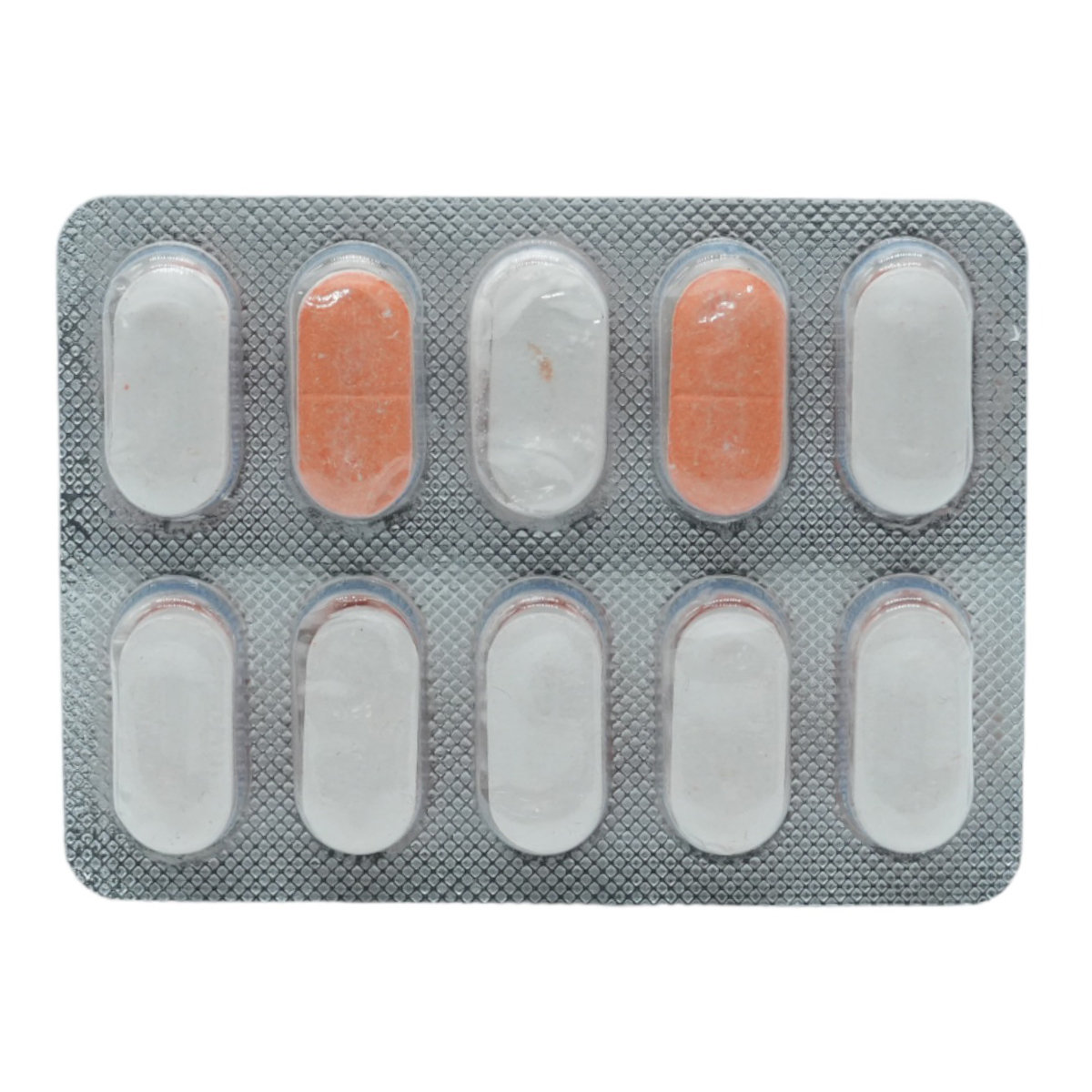
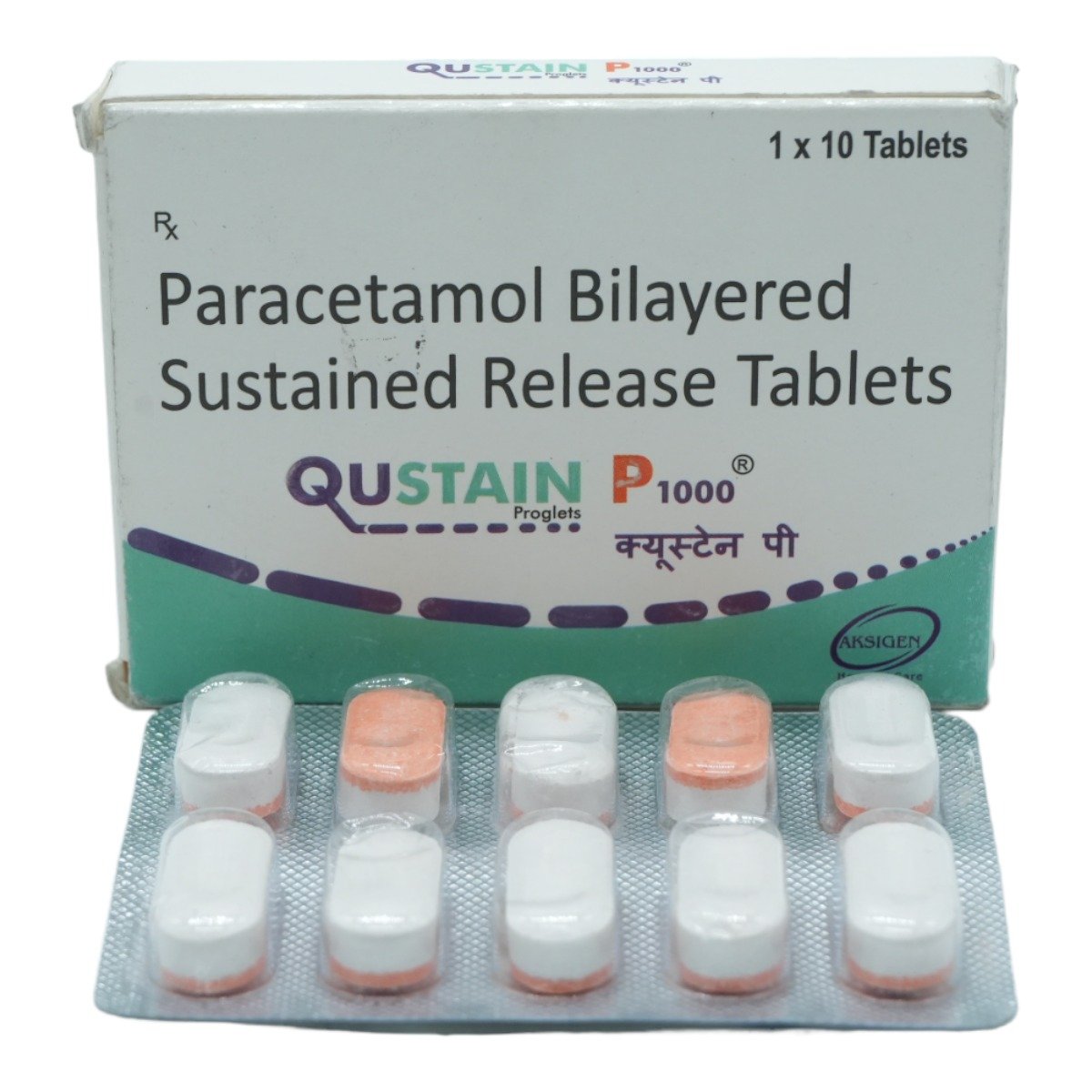
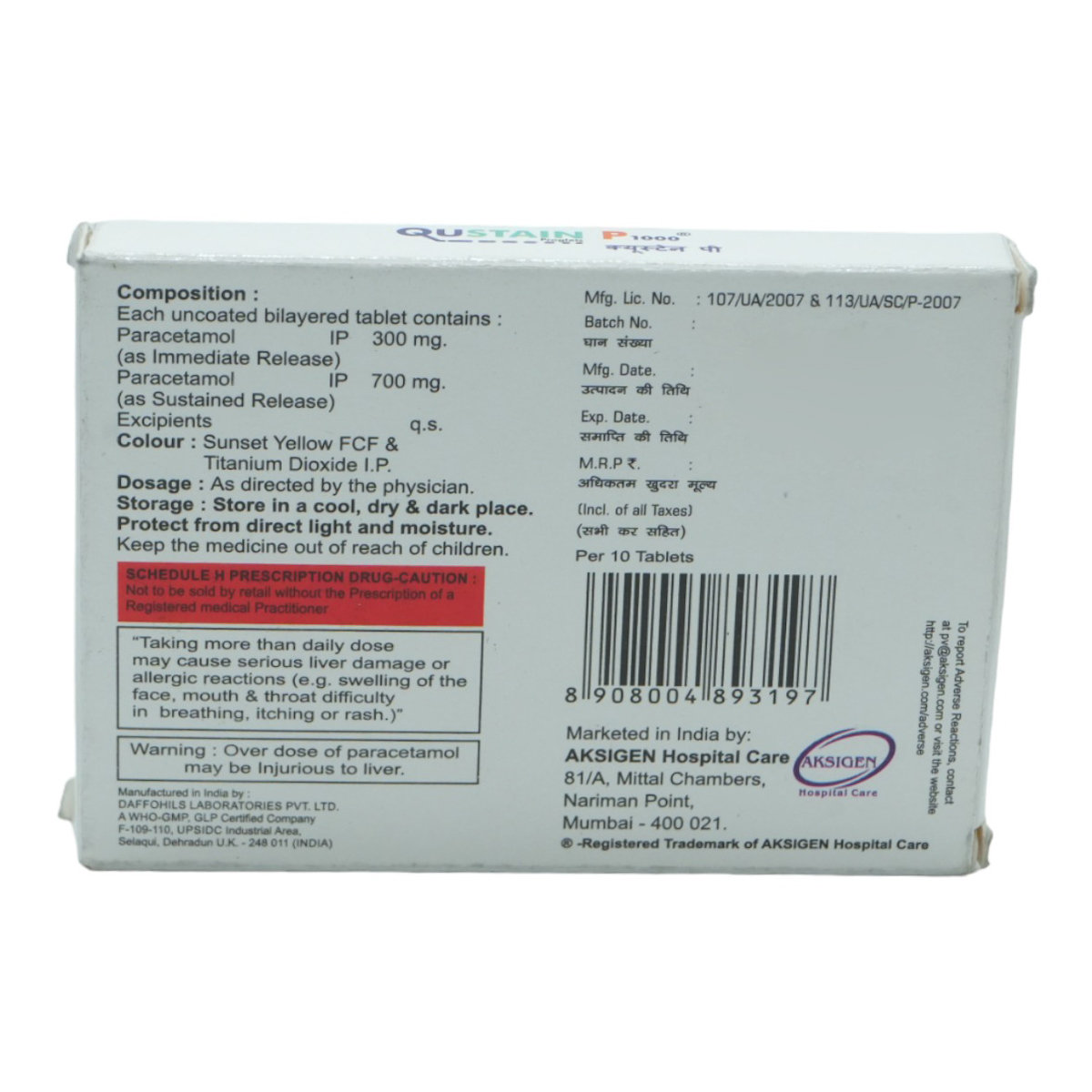
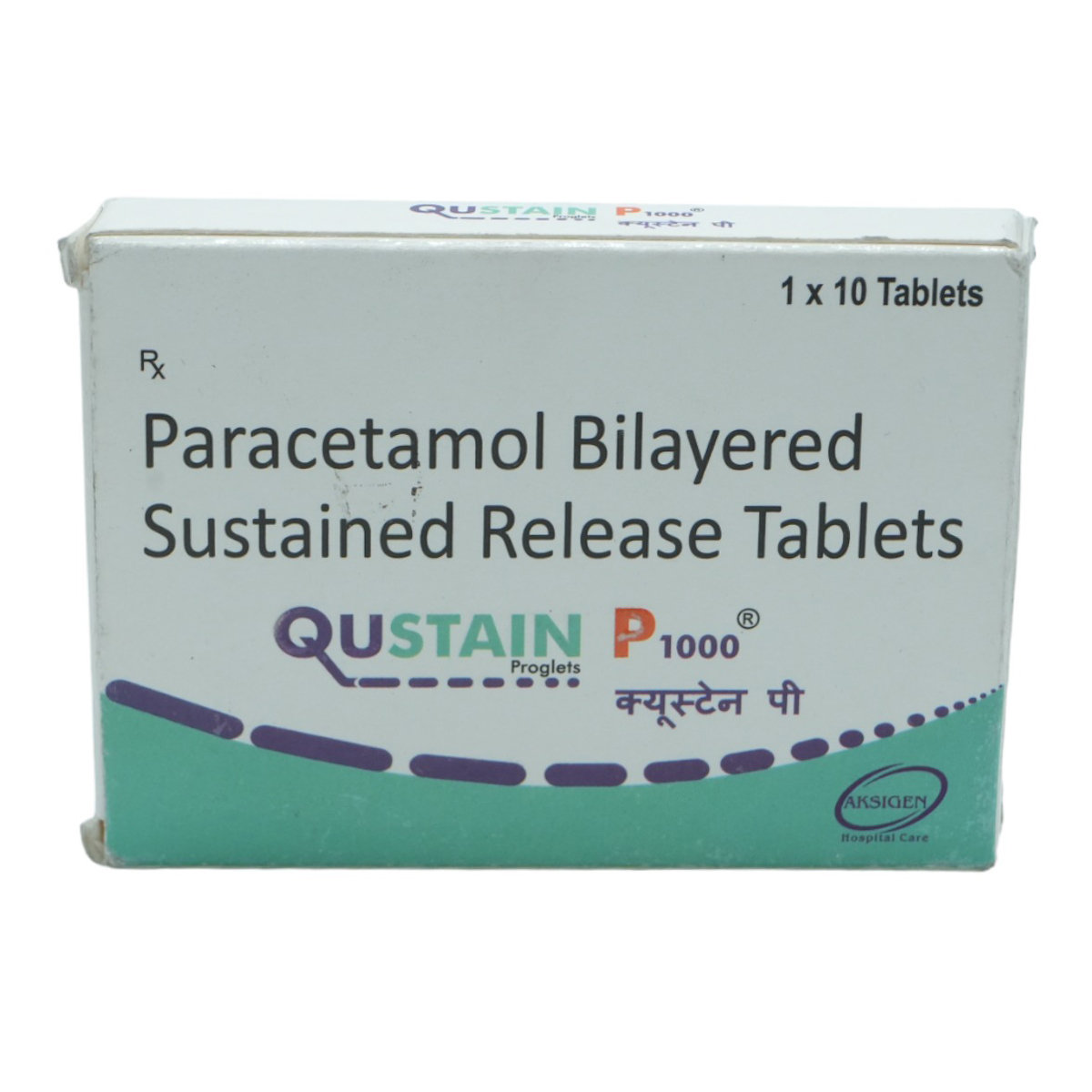


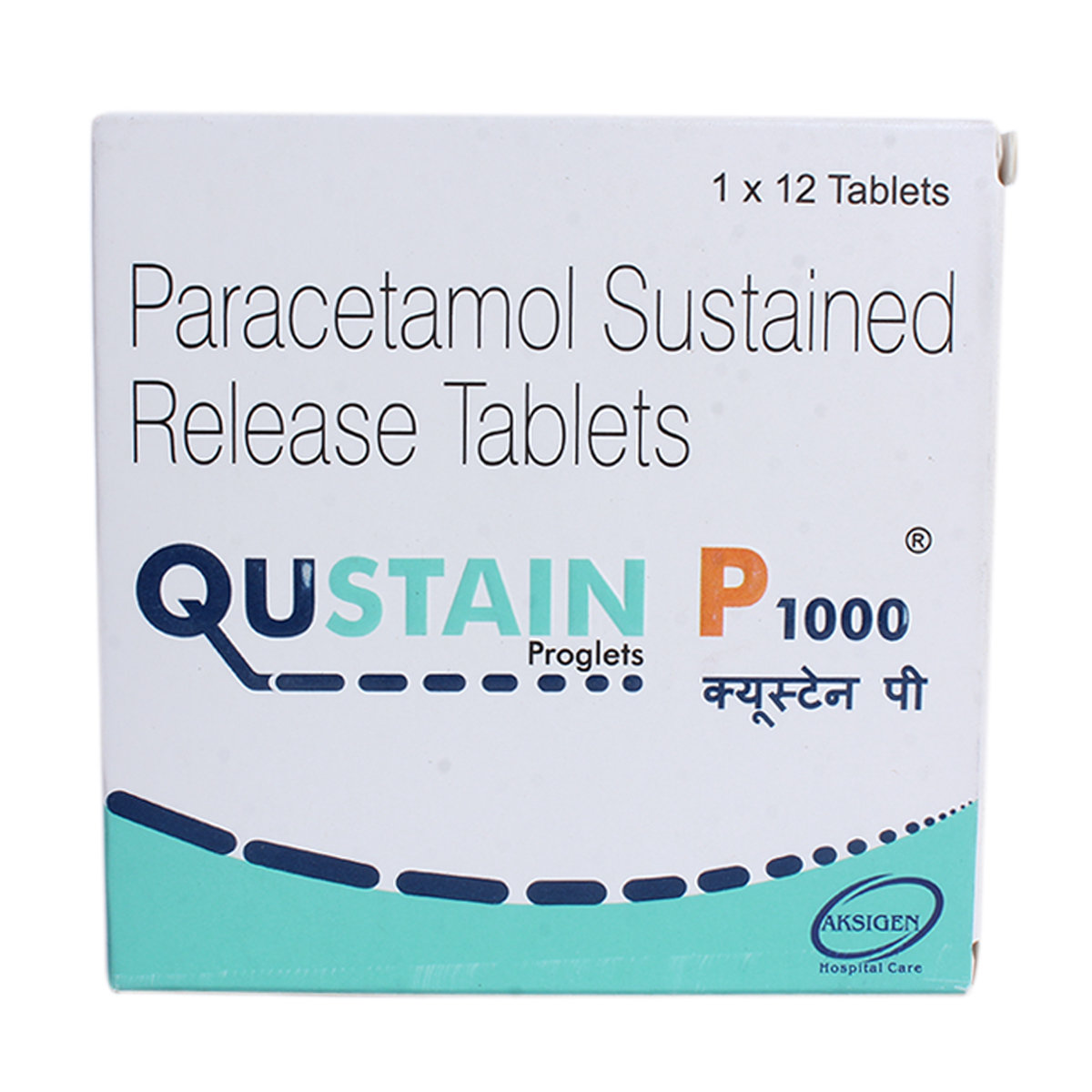
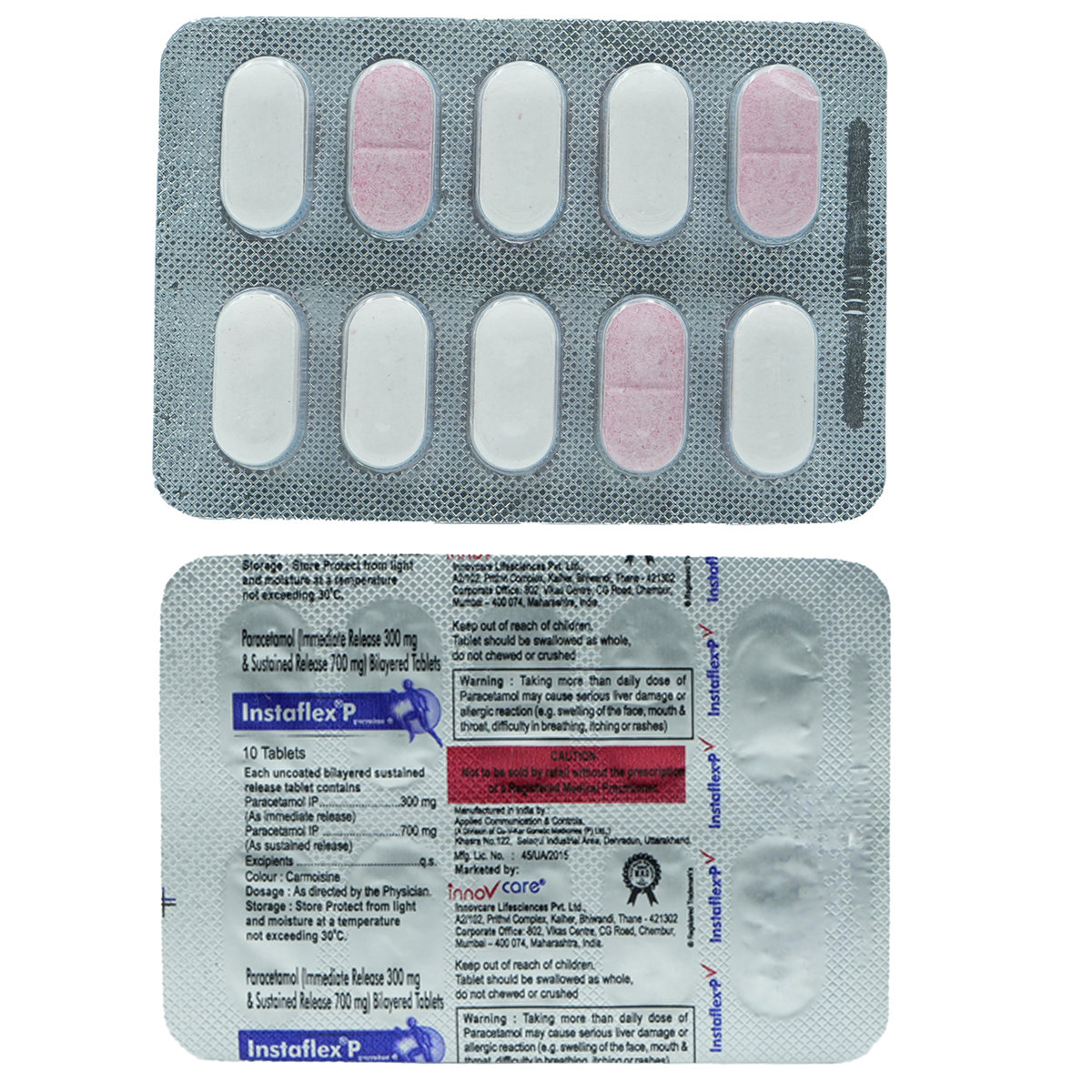


_0.jpg?tr=q-85)
